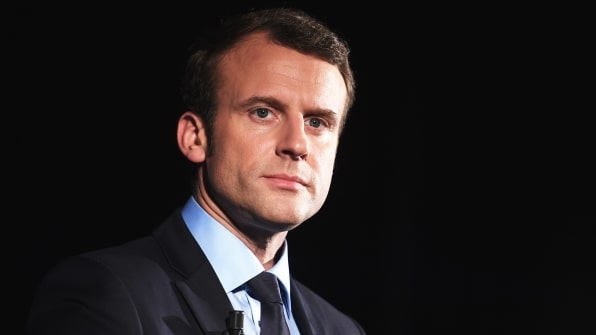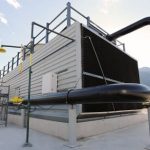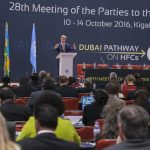France’s Climate Science Grants Want To Make The Planet Great Again–And Thousands Have Applied
In the past, a young American climate researcher with a PhD might have applied to work at NASA or NOAA. Now, some are considering moving to Europe instead.
Since French president Emmanuel Macron announced the “Make Our Planet Great Again” initiative on June 1–inviting climate researchers, entrepreneurs, and nonprofits to come to France, hours after Trump announced his intention to withdraw from the Paris climate agreement–roughly 11,000 people have applied. The program offers $69 million in support to selected applicants; Germany recently announced that it will join France and offer another $17 million.

“This seems like a very good opportunity–and it seems like they’re actually going to fund it,” says climate researcher Daniel Rothenberg, who completed a PhD at MIT in 2016 and is currently employed at the university as a postdoctoral research associate on a project funded by the EPA. Rothenberg plans to leave academia to work in industry this fall, but has also taken the first step to apply for a French grant to study a particular area of interest–how some pollution interacts with clouds to make them brighter and cool the planet, and how calculations of how we can meet the Paris agreement targets may be inaccurate because they don’t fully account for this effect.
The grants are flexible, with no set limits on the amount of time someone can work in France or preference for particular research areas or businesses, as long as they address climate change and are judged to have strong potential. Applicants begin by filling out a series of short questions on the site, including their motivations and goals. Researchers upload a one-page proposal, while entrepreneurs and nonprofit leaders fill out a simple contact form. Applicants are later contacted by someone from the French government to further discuss their plans. (The website will later be updated with a more detailed application. While some academic applications will be reviewed sooner, the website will continue accepting applications at least through the anniversary of the Paris agreement in December.)
In the U.S., funding for grants, especially for young scientists, is limited and very competitive. “There are good fellowships available for postdoctoral researchers and early-career scientists, but they’re very saturated with applicants right now,” he says. “I think there’s a little bit of uncertainty about what offerings there are going to be in the future. I honestly don’t know if the NSF postdoctoral fellowship or the NOAA Climate and Global Change fellowship is going to be offered this coming year.”

“In the U.S., the current administration seems poised to do real damage to U.S. climate science, both in terms of critical observations and the science that goes with it,” says Dennis Hartmann, a professor in the Department of Atmospheric Sciences at the University of Washington. “The effects would be long lasting, as young scientists, especially, would be forced out of the field, and critical observational information would be lost, and some long-term time series broken. Programs like NASA’s Earth Science Directorate suffered under George W. Bush administrations, then rebounded a bit under Obama, and now seem under threat again.”
While Trump’s budget for 2018 proposed a 70% cut in the budget for the Office of Energy Efficiency and Renewable Energy and a 43% cut in biological and environmental research funding at the Department of Energy’s Office of Science–among other cuts–Macron wanted to send a different message about support for climate research. (It should be noted that Congress has rejected some of Trump’s suggested cuts so far. Trump wanted a 19% cut to climate research at NOAA’s Office of Oceanic & Atmospheric Research, for example, but the Senate wants to keep funding at its current levels.) Even before his election, Macron tweeted a video invite to Americans: “Please, come to France. You are welcome. It’s your nation.”
I have a message for you guys. #ScienceMarch pic.twitter.com/ZnkFIIksdx
— Emmanuel Macron (@EmmanuelMacron) February 10, 2017
“We believed since the beginning that climate was a key area to focus on for our president,” says an Elysée source who worked on the program (due to government policy, he cannot be quoted by name). “We believed that during the campaign, and we believed that we needed to go further and faster on it . . . we decided to accelerate at the time Mr. Trump decided to announce that he was going to leave the Paris agreement.”
Some French researchers have criticized the decision to attract international scientists, particularly when the government has also proposed some separate cuts to research funding. But Macron felt it was important to offer global leadership now. “It’s very pragmatic,” says the Elysée source. “We just believed that in order to make things happen, you need a strong political initiative. We know that the U.S. has been the leader in many areas, especially in research . . . Should there not be such political support and willingness to economically support this kind of initiative, especially on climate, we just believe that someone needs to take that initiative. Our president believed that he could be one of them, so that’s why he decided to answer a few hours after Mr. Trump.”
In some ways, it’s more symbolic than a move that is likely to turn France into the leading hub for climate research. It won Macron some early praise, though later disputes on budget cuts–including proposed cuts at universities–have helped tank his approval rating. (He also later welcomed Trump for a visit and said that Trump’s position on Paris would not prevent them from working together.) France pledged €30 million for the new program. Third-party financing from corporate grants and philanthropists will match that, and together, according to some reports, that may fund around 50 researchers, though the government says that the grants are not limited to a specific number. In the U.S., the Advanced Research Projects Agency-Energy alone, or ARPA-E–which both the Trump administration and the House want to eliminate–has a 2017 budget more than 10 times larger than the French government pledge. But as a sign of France’s intentions, it helps boost the country’s image in the eyes of the rest of the world.
For some U.S. scientists, it’s also providing more motivation to advocate for appropriate funding at home. “Maybe this is a call to action for scientists to figure out how to better connect our research to society, and give constituents compelling reasons why they should contact their congressional members to advocate for the budget not continuing to cut research scientists, whether that’s funding at the National Science Foundation or the EPA,” says Heidi Roop, a climate researcher who currently works as a communications lead at the Climate Impacts Group at the University of Washington.
Both Roop and her husband, also a climate scientist, considered applying for the program. But they also recognized that it might be as competitive as grants available in the U.S., and also saw the value in continuing to work with their current colleagues. “I’ve heard very senior scientists say the same thing,” she says. “It’s compelling, it’s really tempting, to actually apply and compete for one of those spots. But when you’re part of a really productive team of people who you feel like are making a difference and making headway, it’s a hard one to step away from that.”

After France made its offer, others have followed: Germany plans to launch its own website as a partner to the initiative. The U.K. also launched a new fund–though not specifically focused on climate–designed to attract international researchers. Canada is similarly investing in a new program to attract international researchers.
France’s program, like the others, is open worldwide, but Americans make up many of the applicants, likely both because of the strength of American academia and business and the current political climate. “I think everybody is definitely more concerned than usual about what might happen over the next three or four years,” says Rothenberg. “In terms of climate science, it doesn’t seem like stuff has been targeted too much yet, but you couldn’t pay me to go work at the EPA right now. That seems like a bad idea.” Trump wants to cut thousands of jobs at the EPA, and the administration offers little support for its work. Scientists who recently prepared a detailed report on the effects of climate change in the U.S. are afraid that the Trump administration will dismiss it.
The French government is hoping that more researchers will want to collaborate with their French counterparts. For anyone who applies, from clean tech startups to nonprofits, Macron’s clear support for climate action should be a draw. The country itself–and its wine and cheese–is part of the package.
“Should you move to France, you would see that the level of education is good, the level of healthcare is good . . . all of these are part of the picture,” says the Elysée source. “Obviously, you don’t move for that, but it’s part of the equation in the end.”
The program will help business applicants navigate red tape, find locations and employees, and additional funding. All applicants will also get support with residence permits and other aspects of relocation.
France is hoping that the program can be part of helping the world meet–and even go beyond–the objectives of the Paris agreement to limit global warming. “If collectively, all over the world, we achieve to respect that agreement, it would be a great thing,” says the Elysée source. “Secondly, we want to improve research and an understanding of our world and climate phenomena. A third aspect is that we expect it to deliver hope . . . we do believe that cleantech can offer new jobs, new industries of the future.”
Fast Company , Read Full Story
(39)













